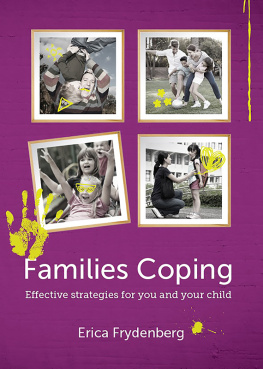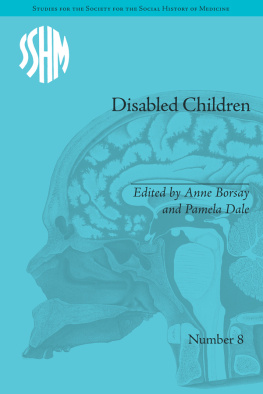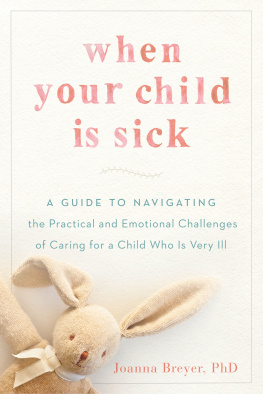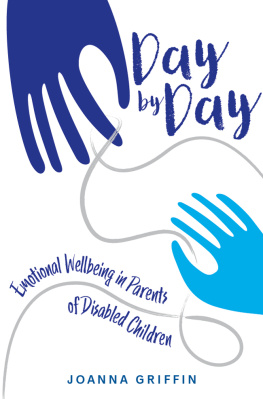Routledge Library Editions: Children and Disability
Volume 4
THE COSTS OF CARING
The Costs of Caring
Families with disabled children
Sally Baldwin
First published in 1985
by Routledge & Kegan Paul plc
This edition first published in 2016
by Routledge
2 Park Square, Milton Park, Abingdon, Oxon OX14 4RN
and by Routledge
711 Third Avenue, New York, NY 10017
Routledge is an imprint of the Taylor & Francis Group, an informa business
1985 Sally Baldwin
All rights reserved. No part of this book may be reprinted or reproduced or utilised in any form or by any electronic, mechanical, or other means, now known or hereafter invented, including photocopying and recording, or in any information storage or retrieval system, without permission in writing from the publishers.
Trademark notice : Product or corporate names may be trademarks or registered trademarks, and are used only for identification and explanation without intent to infringe.
British Library Cataloguing in Publication Data
A catalogue record for this book is available from the British Library
ISBN: 978-1-138-96230-9 (Set)
ISBN: 978-1-315-64761-6 (Set) (ebk)
ISBN: 978-1-138-95103-7 (Volume 4) (hbk)
ISBN: 978-1-138-95106-8 (Volume 4) (pbk)
ISBN: 978-1-315-66840-6 (Volume 4) (ebk)
Publisher's Note
The publisher has gone to great lengths to ensure the quality of this reprint but points out that some imperfections in the original copies may be apparent.
Disclaimer
The publisher has made every effort to trace copyright holders and would welcome correspondence from those they have been unable to trace.
The publishers would like to make it clear that the views and opinions expressed, and language used in the book are the author's own and a reflection of the times in which it was published. No offence is intended in this edition.
The costs of caring
Families with disabled children
Sally Baldwin
Social Policy Research Unit
Department of Social Policy and Social Work
University of York
Routledge & Kegan Paul
London, Boston, Melbourne and Henley
For Emma
First published in 1985
by Routledge & Kegan Paul plc
14 Leicester Square, London WC2H 7PH, England
9 Park Street, Boston, Mass. 02108, USA
464 St Kilda Road, Melbourne,
Victoria 3004, Australia and
Broadway House, Newtown Road,
Henley-on-Thames, Oxon RG9 1EN, England
Set in Times 10 on 12 point
by Set Fair Limited, London
and printed in Great Britain
by The Thetford Press Limited, Thetford, Norfolk
Sally Baldwin 1985
No part of this book may be reproduced in
any form without permission from the publisher,
except for the quotation of brief passages
in criticism
Library of Congress Cataloging in Publication Data
Baldwin, Sally.
The costs of caring.
(International library of social policy)
Bibliography: p.
Includes index.
1. Handicapped children Care and treatment
Great BritainCosts. 2. Handicapped children
Civil rights Great Britain. 3. Cost and standard
of living Great Britain. 4. Family allowances
Great Britain. I. Title. II. Series.
HV888.5.B35 1985 338.4'336282 84-15022
British Library CIP data also available
ISBN 0-7100-9882-0
The completion of this book, and of the study on which it was based, has depended on the assistance of a large number of people. It is very satisfying to acknowledge their help and to thank them.
In the DHSS, the encouragement of Brian McGinnis in the early stages of the study was particularly appreciated, as was his continuing interest in it subsequently.
Professor Graham Kalton, Bob Barnes of the Office of Population Censuses and Surveys (OPCS) and W. F. F. Kemsley all gave advice on sampling problems. Their assistance in helping us to make difficult decisions was invaluable, though responsibility for those decisions rests with the author.
Fieldwork for the study was carried out by Social and Community Planning Research Ltd (SCPR). Thanks are due to SCPR for executing this taxing project with such efficiency - particularly to Douglas Wood and Anne Palmer who supervised the fieldwork and coding operations. Replicating the Family Expenditure Survey (FES) was made easier by the help and advice given by the Social Survey Divison of OPCS. Their willingness to allow us access to FES procedures, from interviewer-training through to coding, made it possible to be confident that in essentials those procedures had been followed. In the Department of Employment, Ann Barber and Vic Maitland were unfailingly helpful in answering questions on FES definitions and in extracting information from the 1978 FES. Depth interviews with families with disabled children were conducted by Pauline Ashley, Rosalind Gray and Sandra Shorter whose tact, sensitivity and perceptiveness were greatly appreciated.
The help and support of my colleagues in the Social Policy Research Unit has been important throughout. Dot Lawton devised the method of drawing the sample of disabled children and monitoring response; Jane Weale undertook the preparation of the data with her usual meticulousness; Christine Godfrey made a major contribution to the analysis. It is quite literally the case that without the collaboration of these three colleagues this book could not have been written. Albert Weale made a significant contribution to . Jonathan Bradshaw and Kathleen Jones read and commented on an earlier version of the manuscript. The final version was typed by Su Wompra with her customary speed and accuracy.
A large debt of gratitude is owed to David Piachaud, not only for his advice on technical problems but for his unwavering belief in the study's value and in the importance of communicating the findings to a wider audience. The support and forbearance of Joe Callan in the long period while this book was being written (and not being written) is also gratefully recognised. Special thanks go to my daughter Emma who accepted the loss of my company in that time with great understanding and patience. My very particular thanks go to the friends who looked after her so well in my absence - particularly Dot Lawton, Christine Richardson and Ann and Mark Gladwin.
Finally, and most importantly, thanks are due to the families with disabled children who took part in the study. In spite of heavy demands on their time they devoted many hours to answering questions and keeping expenditure diaries. I hope that this book accurately reflects their experience and that it has some influence on the future development of policies for disabled children and their families.
The birth of a child who is severely disabled is likely to have profound and far-reaching consequences for families. The consequences may be psychological. The stress involved in adapting to the child's condition and its long-term implications can be considerable - and may be compounded in battling for support from a confusing and often unhelpful array of 'helping' agencies. They may also be practical and physical. Severe disablement in a child will usually mean that the dependency of infancy is greatly prolonged. Hence there will be continuing demands on parents' time and energy: feeding, washing and dressing children who are unable to do these things for themselves; coping continuously with incontinence; lifting and carrying children who cannot move independently; stimulating children whose intellectual development is slow or who suffer sensory impairments; containing the behaviour of hyperactive or destructive children. These demands which tend to increase rather than diminish as children grow up, may have financial implications. Parents' earning capacity may suffer. Simultaneously the child's condition may create needs for extra or special expenditure of various sorts.









